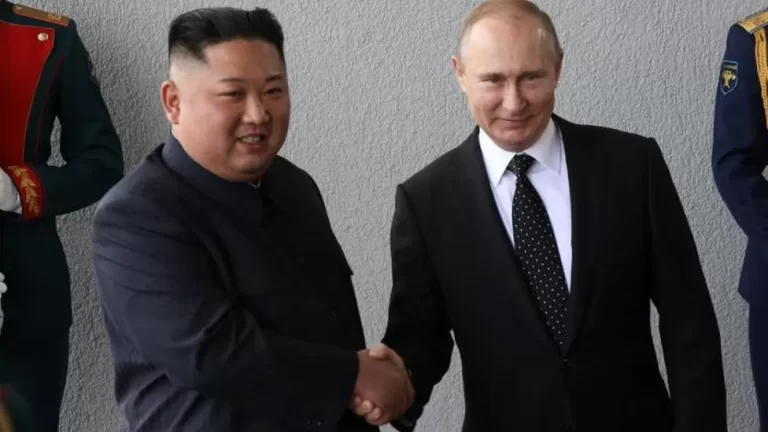Vladimir Putin and Kim Jong Un have а lot in common.
Neither gets out much. The Kremlin leader hasn't left Russia this year. In Kim's case, make that four years. Both Russia and North Korea have been accused of becoming “rogue states”.
Both are under heavy international sanctions. Both governments rail against the “hegemony” of the United States. Often a common enemy can bring leaders closer together. And so it is with Putin and Kim. Theirs is a marriage made, if not in heaven, then certainly in the geo-political realities of 2023.
A bromance? Not exactly. Unlike former US President Donald Trump, who once declared that he and Kim Jong Un “fell in love”, the leaders of Russia and North Korea are less effusive in their public displays of affection. But both Vladimir Putin and Kim Jong Un see potential benefits from a closer relationship.
Much to gain
So, what's in it for the Kremlin?
For a start, North Korea has a huge defence industry with large-scale production capabilities. With Russia's war in Ukraine grinding on, Pyongyang could prove an invaluable source of munitions for Moscow.
Washington suspects the Kremlin has already clicked that. The United States claims that arms talks between Russia and North Korea have been “actively advancing” with Russia allegedly seeking supplies of ammunition and artillery shells.
No confirmation of that from Russian officials. But plenty of unsubtle hints that Russia and North Korea intend to boost military cooperation.
Back in July Sergei Shoigu became the first Russian defence minister to visit North Korea since the break-up of the Soviet Union, when he attended events marking the 70th anniversary of the Korean armistice. Kim Jong Un played tour guide as he showed Mr Shoigu around a weapons exhibition. The defence minister has also hinted that joint military exercises are in the pipeline.
“If they are looking for weaponry in North Korea, one of the poorest and less developed countries of the world – an isolated country – to my mind that is the utmost humiliation of the propaganda of Russian ‘great power',” believes former Russian foreign minister Andrei Kozyrev. Mr Kozyrev was speaking to me in a video call from the United States where he currently resides.
“A great power would not go to North Korea for an alliance or military supplies.”
Kith and Kim
But a power intent on overturning the world order might. With his full-scale invasion of Ukraine, Vladimir Putin signalled his determination to remake the global order to Russia's liking. Military cooperation with North Korea may be another sign of that.
An arms deal between Moscow and Pyongyang would represent quite a shift change. Until recently Russia had been full-square behind UN Security Council sanctions against North Korea over its nuclear weapons programme. Among other things, those sanctions ban the trade of weapons with North Korea.
“Moscow had put its signature to those Security Council resolutions,” Russian tabloid Moskovsky Komsomolets reminded readers last week. But it added:
“Never mind. A signature can be revoked.” The paper quoted the chairman of Russia's Council on Foreign and Defence Policy Fyodor Lukyanov as saying:
“For a long time now the question's been asked: why are we [Russia] abiding by these sanctions? The whole system of international relations is in a state of total pandemonium.
“Of course, the UN sanctions are legitimate. It's hard to deny that. We voted for them. But the situation has changed. Why not revoke our vote?”
That would be music to Kim Jong Un's ears.
Together forever?
What else may North Korea be hoping to get from Russia? Almost certainly, humanitarian aid to help alleviate North Korea's food shortages. There's also speculation that Pyongyang has been seeking advanced Russian technology for satellites and military use, including for nuclear-powered submarines.
More than a year and a half into a war that has gone badly wrong for Russia, Moscow may well need to replenish its munitions stocks. It may well see a deal with Pyongyang as a way of helping to achieve that. But that doesn't mean that, without North Korea's help, Russia's war machine is about to grind to a halt.
“Putin is not desperate,” believes former foreign minister Andrei Kozyrev. “He can sustain this for a very long time and he can adapt. He learns every day how to circumvent the sanctions, how to cooperate with China, with North Korea and some regimes in Africa. That is not an alternative for the future. But it is an alternative for the present time. And maybe for years to come.”
— CutC by bbc.com


